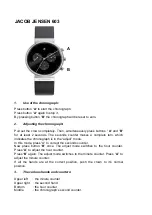
Navigating with Sight 'N Go
You can point the device at an object in the distance, such as a
water tower, lock in the direction, and then navigate to the
object.
1
From the watch face, select >
Navigate
>
Sight 'N Go
.
2
Point the top of the watch at an object, and select .
Navigation information appears.
3
Select to begin navigation.
Navigating To Your Starting Point
You can navigate back to the starting point of your activity in a
straight line or along the path you traveled. This feature is
available only for activities that use GPS.
1
During an activity, select >
Back to Start
.
2
Select an option:
• To navigate back to the starting point of your activity along
the path you traveled, select
TracBack
.
• To navigate back to the starting point of your activity in a
straight line, select
Straight Line
.
Your current location
À
, the track to follow
Á
, and your
destination
Â
appear on the map.
Stopping Navigation
1
During an activity, hold
MENU
.
2
Select
Stop Navigation
.
Compass
The device has a 3-axis compass with automatic calibration.
The compass features and appearance change depending on
your activity, whether GPS is enabled, and whether you are
navigating to a destination. You can change the compass
settings manually (
). To open the
compass settings quickly, you can select from the compass
widget.
Map
represents your location on the map. Location names and
symbols appear on the map. When you are navigating to a
destination, your route is marked with a line on the map.
• Map navigation (
• Map settings (
Panning and Zooming the Map
1
While navigating, select
UP
or
DOWN
to view the map.
2
Hold
MENU
.
3
Select
Pan/Zoom
.
4
Select an option:
• To toggle between panning up and down, panning left and
right, or zooming, select .
• To pan or zoom the map, select
UP
and
DOWN
.
• To quit, select
BACK
.
Map Settings
You can customize how the map appears in the map app and
data screens.
Hold
MENU
, and select
Settings
>
Map
.
Orientation
: Sets the orientation of the map. The North Up
option shows north at the top of the screen. The Track Up
option shows your current direction of travel at the top of the
screen.
User Locations
: Shows or hides saved locations on the map.
Auto Zoom
: Automatically selects the zoom level for optimal
use of your map. When disabled, you must zoom in or out
manually.
Altimeter and Barometer
The device contains an internal altimeter and barometer. The
device collects elevation and pressure data continuously, even
in low-power mode. The altimeter displays your approximate
elevation based on pressure changes. The barometer displays
environmental pressure data based on the fixed elevation where
the altimeter was most recently calibrated (
). To open the altimeter or barometer settings quickly,
select from the altimeter or barometer widgets.
History
History includes time, distance, calories, average pace or speed,
lap data, and optional ANT+ sensor information.
NOTE:
When the device memory is full, your oldest data is
overwritten.
Using History
History contains previous activities you have saved on your
device.
1
Hold
MENU
.
2
Select
History
>
Activities
.
3
Select an activity.
4
Select an option:
• To view additional information about the activity, select
Details
.
• To select a lap and view additional information about each
lap, select
Laps
.
• To select an interval and view additional information about
each interval, select
Intervals
.
• To view the activity on a map, select
Map
.
• To view the impact of the activity on your aerobic and
anaerobic fitness, select
Training Effect
(
).
• To view your time in each heart rate zone, select
Time in
Zone
(
Viewing Your Time in Each Heart Rate Zone
).
• To view an elevation plot of the activity, select
Elevation
Plot
.
• To delete the selected activity, select
Delete
.
Multisport History
Your device stores the overall multisport summary of the activity,
including overall distance, time, calories, and optional accessory
data. Your device also separates the activity data for each sport
segment and transition so you can compare similar training
activities and track how quickly you move through the
transitions. Transition history includes distance, time, average
speed, and calories.
Viewing Your Time in Each Heart Rate Zone
Before you can view heart rate zone data, you must complete an
activity with heart rate and save the activity.
Viewing your time in each heart rate zone can help you adjust
your training intensity.
History
15
















































